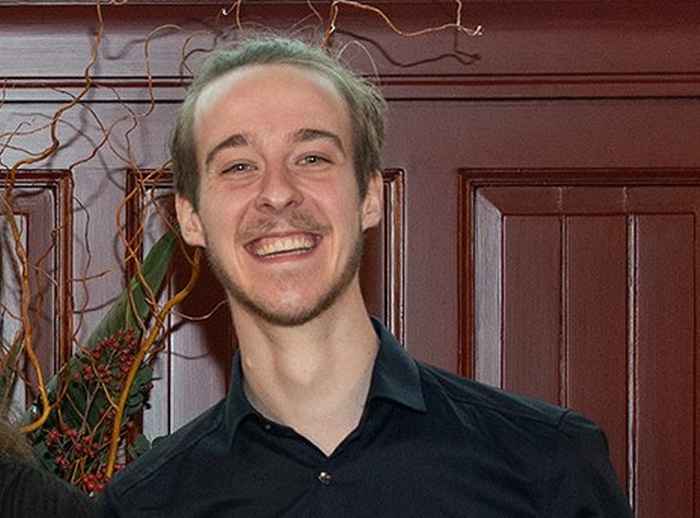KHMW Graduation Award for David Konijn and three Incentive Prizes
29 November 2023
Louise Gunning-Schepers, the president of KHMW, welcomed the group of 87 Young Talent Award winners. In three sessions, 20 Graduation Awards and 67 Incentive Awards were awarded. Each session starting with an introduction, especially for the award winners, by Ionica Smeets, professor of science communication at Leiden University.
Graduation award
The KHMW Young Talent Graduation prizes are awarded for exceptional achievements, to students who graduated in the academic year 2022-2023 at a Dutch institution of academic education.

David received the graduation prize for Astronomy (3,000 euro), for his thesis 'Monitoring the Hyperactive Repeating Fast Radio Burst source FRB 20220912A with the Nancay radio telescope'
The jury about David’s thesis
“David Konijn has conducted a very exciting master research project on so-called ‘Fast Radio Bursts (FRBs)’. One would maybe think that the Universe only varies on very long timescales, but this is not the case. Fifteen years ago it was discovered that there are enormous bursts of emission at radio wavelengths that last only a fraction of a second, but with an energy output of up to millions times of that of the Sun. Possible mechanisms involve enigmatic objects such as hyper-magnetized neutron stars or black holes.
David developed a new algorithm to search for radio bursts in repeating FRBs, focusing on radio observations of FRB 20220912A from the Nancay radio telescope in France. Analyzing many observations he discovered more than 700 individual bursts – showing this source to be extremely active, having much more frequent bursts than expected. This alone is already a fantastic result, but David went much further, devising an automatic classification system with duration, spectral extent, arrival time and such, showing that one-off FRB’s may actually be repeating bursters for which we only see the brightest event. A very interesting result.
David has a bright future ahead of him, graduating cum laude, already started a PhD in Groningen – applying many skills he developed during his master research.”
Incentive prizes
The KHMW Young Talent Incentive Awards were established to promote interest in studies in the natural sciences, information sciences, life sciences and engineering. The prizes of €500 are awarded annually in recognition and appreciation of the best study performance in the first year of studying in the relevant fields at a Dutch academic institution.
As many as three-quarters of all 67 nominees, across all fields of study, achieved an average grade of 9 or higher. The KHMW jury was very impressed by the study achievements of the nominees. Several nominees followed a more extensive study programme than the compulsory part alone. For example, they followed a double Bachelor's degree (such as Mathematics & Physics, or Mathematics & Computer science), sometimes with additional subjects, or a special honours programme. Several nominees also contributed to extra activities in their first year, such as informing prospective students.
- Sarah van Wijk received an incentive prize for Chemistry
Sarah van Wijk was one of the winners and received an incentive prize for Chemistry. She told us what she likes about her field of study: “Chemistry is a broad field that also combines components of biology, physics and mathematics. Besides its focus on fundamental knowledge, chemistry also aims to solve solutions for scientific dilemmas. Personally, I enjoy the synthetic puzzels and many biochemical applications that chemistry has.”
- Michiel Erkamp received an incentive prize for Physics
- Carmen Berghuis received an incentive prize for Mathematics